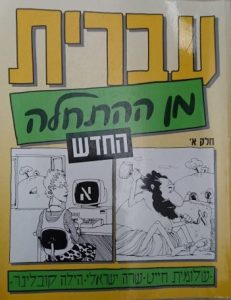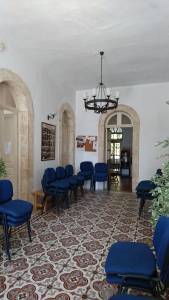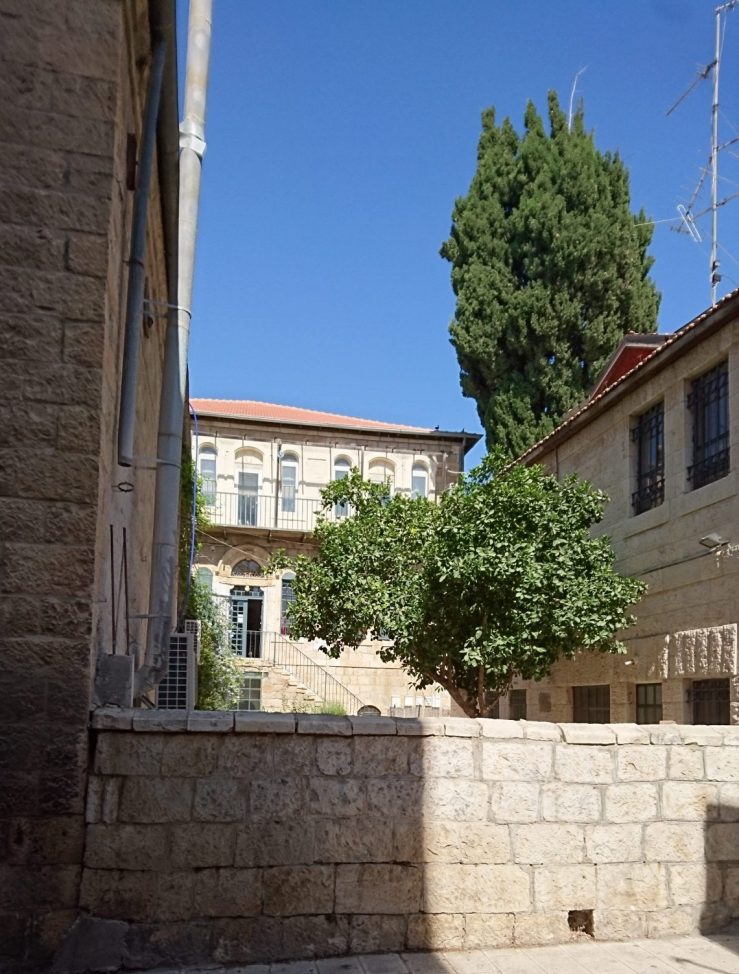
For the month of July, I hit my head against the hard wall of the Hebrew alphabet and language, in an intensive course at the Polis Institute. This is the first time that I’ve learned an alphabet to learn a language, but not the first time I tried to learn Hebrew. I should say two alphabets, since handwritten letters are shaped differently from printed ones.
Shock one: it is harder to learn a language that uses an alphabet different from the Roman or Latin alphabet because suddenly you are illiterate.
My first attempts at reading in Hebrew went something like this: the fish-hook is a “t”, the crown is also a “t”, the snout is a “b”, the thing that looks like a chair is “l” and the snail-shell is “p” or “f.” By the end of July, I could silently spell out each word (grade one level?). Now there are at least three words that I recognize on sight: what, wine and chocolate.
Schools for learning Hebrew are called Ulpan; they are designed to quickly immerse new arrivals in the language and culture of Israel. Until its 19th century revival, Hebrew was restricted to a sacred use, and then it was modernized for use by Israelis in the mid-20th century.
Shock two: religion comes to class.
Some of the students in my class are literate in the Hebrew alphabet because they have learned biblical Hebrew. Many of the students are Christians, here to learn the language of the Old Testament. In class, the language is inseparable from religion: for the days of the week, we learn about the Sabbath, and discuss what we do on this day. We sing a Sabbath song. Reading a text about a museum, we learn the difference between Menorahs and Chanukahs. I begin a list in my notebook titled Religious Vocabulary, with holy days and relevant nouns.
In one month and ten chapters, we learn to count in feminine and masculine, to tell the time, to buy dates and figs. We learn to ask where the wine is from, to respond to apartment rental ads, to discuss whether we’d want to live on a kibbutz and where we’d like to go in Israel. At no time in the course do we learn about mandatory military service for Israelis.

Hebrew is taught without explanation in any other language, through the use of pictures, songs, and mime. The teacher holds up a black and white line drawing, cartoon style, of a group of people of all ages and sizes looking very happy, waving, some open mouthed, some smiling. Everyone else has nodded at this illustration of the word we are learning. To save time, for once the teacher allows me to guess. I hazard: choir? Band? No, no. Into my ear comes the whisper: family.
Shock three: culture shock. I’d heard about families large enough to make their own sports team, but because I was stuck in my Canadian perspective of family = 2.5 (unhappy) persons, I could not see what I was looking at.
There were other situations that I misunderstood. For example, I thought that this situation: (teacher picks up cell phone, blahblahblahSMS, teacher clicks on it, SMSblahblahblahblah) meant there was a word for SMS messages; the word the teacher was demonstrating turned out to be get.
Shock four: the decline in my language acquisition faculties. The youthful in the class hear a word once, maybe twice, and remember it. I hear it and five minutes later ask, Mah zé (what that?). Or, reading right to left, and bearing in mind that vowels are not marked and the curvy last letter is silent — the hut with chimney and crooked walking stick: מה זה. There should be a special word for the humiliation of a bookish person becoming illiterate and an articulate person becoming inarticulate. As for being unable to memorize long lists of words daily, there is already a word for that: aging.

Then there is the question of relevance. Often the teacher asks each student the same question in turn. Such as: Do you go to the disco on Friday night? What do you want to be? I answer that I don’t dance, and I want to be who I am. What is your favourite song to sing? “100 Bottles of Beer on the Wall” is the only song that comes to mind – not exactly appropriate given the religious component above. I say I don’t sing.
After 20 hours of classes (one week), and a persistent headache (is there a physiological reason to develop headache while learning a new language?), I wondered why I was doing this. In Kenya I studied Swahili, in Austria German. In both cases my belief that learning the language would give me insight into the culture was proven true. This time, the difficulty of my task made me doubt the necessity of memorizing long lists of vocabulary
For this month of humiliation and headache, there was a reward. It came not from the teacher but through the hours of homework. The word for salt is melach: מלח. This refers to both table salt and to bodies-of-water salt — the Dead Sea is actually called Sea the Salt: ימ המלח. In one of the homework exercises we are asked to choose from two words (sugar, salt) to fill in two blanks in a sentence that reads something like: In good family life, blank is better than blank. My mind strayed to the bins of candy in the markets here. Sugar is better than salt?
The week that I filled in these blanks, three Palestinians were shot during demonstrations over the installation of metal detectors at the entrances to the mosque complex in the old city, where two Israeli soldiers were killed the week before. During the escalating tensions in Jerusalem, I read a homework text that forced me to look up a word that looks like salt-what, or melach-mah: מלחמה. It means: war. Sugar is indeed better than salt.
Shokolad. Chocolate. שוקולד My favourite is bittersweet.

WOW!!!! Sounds impossible but look what you have learned already.
……loved reading your blog.